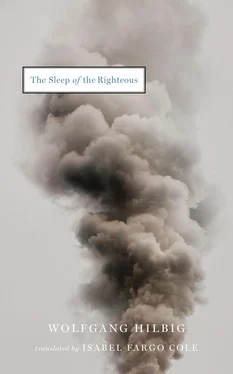How can you sit calmly at a table and write, I said to myself, and set down the impression of a completely inert town, when you’re constantly tormented by the knowledge that someone out there in the dark is being hunted, and may this very moment be running for his life?
However frightful the deluge of refrigerator noise: I seemed to keep hearing those hasty steps out on the street. From the moment I arrived in M. I was unable to escape the thought. The door to the next room, with the street window, stood ajar, and I heard the clatter and shuffle of well-worn shoes on the crooked stones of the sidewalk. First it was a single person’s steps; soon I thought several others were following him. After a while the single steps returned, and sometimes they strayed into the yard, sometimes coming right beneath the two kitchen windows between which I sat, listening in horror. In a moment I could expect him to call my name. . I stood up and extinguished the light. Once I felt safe, I turned the lamp on again: of course it wouldn’t burn; I climbed onto the table, lighting my way with the cigarette lighter, and jiggled the cable until the two fluorescent tubes shone once more. The whole thing repeated until my thoughts were in tatters: that crackling and flaring, and then again the slackening steps, once it had grown still.
Sometimes it ceased, but the hunt in the streets was far from over. He had managed to shake them only temporarily. It seemed he’d hidden himself in a dark corner; my yard served in a pinch to let his pursuers pass by. But all he got was a breathing spell; soon they tracked him down again. They were long since wise to all his ruses, they’d been after him for years; I would have had to count back to say when this story had begun. There was no reason for it. . no one out there knew any reason. — And often enough they caught him, presumably they could catch him at their whim. At any time they could corner him and let him run into a trap: he was one man, there were always more of them, they took turns, they could increase their force at will.
I recall all too well how once, in the very beginning, when their malice was still boundless — a few weeks, in other words, after setting their sights on him — they had snatched him off the street and beaten him horribly. It was a winter night, between three and four in the morning, when I heard a voice calling softly outside the kitchen windows and thought I could make out my name. With the last of his strength he’d dragged himself into my yard, where he collapsed in the slush. I had to help him up the stairs; evidently he could hardly see. I helped him lie down on the sofa in the kitchen and administered several shots of liquor. His lips were split, blood dripped from his nose. Both eyes had swelled nearly shut, and shards from his glasses were embedded in his lacerated brows, clearly due to a blow from a truncheon. I tried to get some explanation out of him, but he merely hissed out profanities and curses; he murmured on even after falling asleep.
Not long after this scene he was sent to prison for a year; on his release his papers bore a stamp authorizing him to cross the border. He had three days to leave the country; together we went around to the authorities, whom neither of us cared to visit, to gather the signatures he needed, attesting, among other things, that he’d paid his electric bills, had no outstanding library books, and had taken care of the fee for clearing out his cellar. An hour before his departure we packed his belongings, filling barely half of an olive canvas duffel bag. In the afternoon I accompanied him to the last bus to the district capital, which he had to take to catch the interzonal train to Frankfurt am Main that would bring him across the border before midnight. I refused to believe that he was glad to go. We were silent for most of the way to the bus station, or at least we didn’t speak of how he was leaving the country with no real conviction, and no precise notion what his destination was. He was limping, but insisted on carrying the bag himself; though it weighed nearly nothing, it pulled his slender shoulders askew. Before boarding the bus, he turned his face to me, now pale, and said he’d never set foot in this country again. — You’ve got no other choice, I thought, but didn’t say it out loud; I saw him sitting behind the grimed bus window, staring stoically straight ahead. There was no point in waving again, for as the bus drove off, I saw that his eyes were closed behind his thick lenses; an inscrutable smile played about his lips.
Just a few days later I could have sworn I saw his duffle bag again. I happened to walk down the street where he’d lived, and saw it lying on the sill of the ground floor window, which had never had curtains. I’d often worked myself up about that: he offered an unobstructed view through his window to every sewer rat and every belly-worm employed by the state apparatus. It was all the same to him. — I knocked on the pane; nothing stirred, so I went into the building and hammered on the door of his flat: no one answered; his name plate had been removed from the front door.
Revenge! Revenge, I thought, it could only be revenge that they’d wanted. — But revenge for what? — I still sought an explanation for the story, but there was no chance for an explanation. At any rate, there were always enough people to put together a posse! There were policemen and secret policemen, and any number of overzealous little snitches who would have given anything to play Inspector Maigret. Who even did it free of charge, just to show how much they cared about law and order in this town. How many humble citizens with windows on the street took up their posts behind the curtains at the least unusual noise? I couldn’t imagine that, of all their traits, this one might have changed.
And yet my friend wasn’t even a homosexual or a Jew, he wore his hair only moderately long, and he had no car to commit a parking violation. He was only a humble chemist who’d quit his job at the factory because he was over-qualified, and since then stayed afloat by repairing TV sets; word had gotten out that he did a better job than the official service company. He spent his spare time in his tiny apartment, hunched over inscrutable chemical formulas, painting abstract pictures, or developing his own amateur photos. Now and then he’d drink a drop too much. The anonymous letters about him received by a certain section of the municipal council described nocturnal gatherings in his apartment that went on into the morning. I had attended several of those gatherings; the way they talked about literature and music put me in a foul mood, and I went home early.
Now, when I walked past his former apartment, I looked back wistfully on those discussions; my arrogance has long since fled. The little discussion groups had scattered soon after his expulsion. And they had never come back together again, not even now. . even less so now, in the time after the system’s collapse, when it actually would have been possible: today there seemed not a person left in town who talked voluntarily about literature. Only the others, literature’s adversaries, had remained. They hunkered behind the haze of their curtains and kept the street under surveillance. But there was no one down there who was not of their ilk.
I had never succeeded in describing the town. Neither from up close nor from afar; I simply hadn’t found a way to look at it, I saw that more and more clearly. — It was he who could have pulled off this description, and in his own way, though quite unintentionally, he had pulled it off. This was what I thought when I passed by his window, behind which he was often seen puttering around; now curtains hung against the polished panes, and inside a TV flickered murkily. My friend had merely released the shutter of his camera one cold fall Sunday, and the snapshot produced at that moment had unmasked the town. Three o’clock: at precisely that second the town had frozen to an image of black and white lifelessness. And they had been after him ever since. — Maybe they’re only after the photo, I thought. If they got it, would they leave him in peace? — But I never really believed that.
Читать дальше












